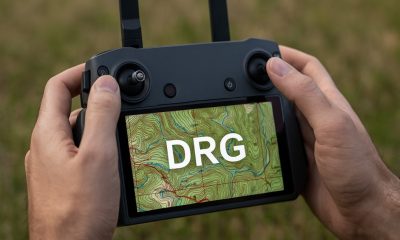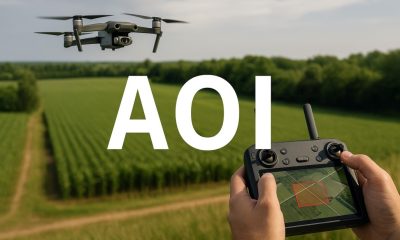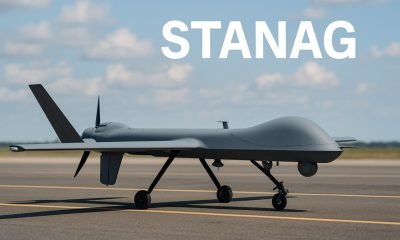- Acronym Guide
- AAM
- ABS
- AC
- ACAS
- ADS-B
- AFAC
- AGL
- AI
- AIM
- ALS
- AM
- AMA
- ANSP
- AOI
- APPI
- AUV
- AUVSI
- ARPAS-UK
- ASTM
- ATC
- BVLOS
- CAA
- CAAC
- CAB
- CASA
- CATT
- CBO
- CBR
- CBRN
- CDMA
- CDR
- CFR
- CIR
- COA
- COMINT
- CORS
- COTP
- COTR
- CPTED
- CV
- C2
- DAA
- DEM
- DFI
- DFS
- DGCA
- DHS
- DOD
- DPA
- DPEs
- DRG
- DRO
- DSM
- DSMX
- DSP
- DSSS
- DTM
- EASA
- EFT
- EO
- EOD
- EO/IR
- ELINT
- EMI
- ESC
- EVLOS
- eVTOLs
- FAA
- FCC
- FCS
- FHSS
- FICCI
- FLIR
- FOB
- FOV
- FPS
- FPV
- GBDAA
- GCP
- GCS
- GDPR
- GML
- GNSS
- GPS
- GSD
- GVC
- HDR
- HOGE
- IACRA
- ICAO
- ICS
- IMU
- INS
- IR
- ISA
- ISR
- ITU
- JARUS
- LAAMS
- LAANC
- LAATM
- LAI
- LBA
- LIDAR
- LOS
- LSALT
- MAC
- MAVLink
- MLIT
- MMS
- MSL
- MTOM
- NDAA
- NCSL
- NFZ
- NIST
- NMEA
- NOTAM
- NPA
- NPRM
- NTIA
- OBIA
- OEM
- OFDM
- OOP
- PASM
- PAV
- PCV
- PdM
- PEC
- PIC
- PID
- PIPL
- PLD
- PM
- PN
- PPK
- PPS
- PSM
- PWM
- UAM
- UAOP
- UAS
- UASTM
- UAV
- UCAVs
- UHD
- UHF
- USV
- UTM
- RAIM
- RCC
- RCS
- RFI
- ReOC
- RePL
- RMS
- ROI
- RPAS
- RPC
- RTH
- RTK
- SaR
- SAR
- SARP
- SBAS
- S.Bus
- SBIR
- SEDENA
- SfM
- SFOC
- SIGINT
- SLAM
- SMS
- SORA
- STANAG
- STTR
- sUAS
- TCAS
- TCCA
- TFR
- TIN
- TOF
- TP
- TPS
- TSA
- VHF
- VLOS
- VTOL
Drone Acronyms
What is GVC (General VLOS Certificate) & How Does it Work?
By
Jacob StonerTable Of Contents

Definition
GVC stands for General Visual Line of Sight Certificate. It is a certification that allows drone operators to conduct Visual Line of Sight (VLOS) operations within specific regulatory frameworks, typically under the jurisdiction of a national aviation authority, such as the UK’s Civil Aviation Authority (CAA). The GVC certifies that the operator has the necessary knowledge, skills, and experience to conduct VLOS operations safely and in compliance with regulations.
Usage
The GVC is used by commercial drone operators who need formal certification to conduct VLOS operations legally. It demonstrates that the operator has passed both theoretical and practical assessments, proving their ability to manage and operate drones safely within the visual line of sight. The GVC is often required for conducting more complex operations or for obtaining specific operational authorizations.
Relevance to the Industry
The GVC is essential for professional drone operators as it provides formal recognition of their competency to conduct VLOS operations. Holding a GVC can be a prerequisite for more advanced certifications or for obtaining permissions to operate in controlled or restricted airspace. It also reassures clients and regulatory bodies that the operator adheres to high safety and operational standards.
How Does the General VLOS Certificate (GVC) Work?
Training and Education:
- Enrollment in a Recognized Training Program:
- Accredited Providers: To begin the process of obtaining a GVC, the drone operator must enroll in a training program offered by an accredited training organization. These organizations are approved by the national aviation authority, such as the UK’s Civil Aviation Authority (CAA), to provide the necessary education and training.
- Curriculum Coverage: The training program covers both theoretical knowledge and practical skills. Topics typically include airspace classifications, flight safety, meteorology, drone systems, risk assessment, and operational procedures.
- Theoretical Examination:
- Knowledge Test: After completing the theoretical part of the training, the operator must pass a written examination. This test assesses the operator’s understanding of the regulatory environment, operational limits, emergency procedures, and other critical aspects of safe drone operation.
- Preparation Materials: Training providers often supply study materials, practice exams, and additional resources to help candidates prepare for the theoretical test.
Practical Assessment:
- Practical Flight Assessment:
- Skill Demonstration: The operator must demonstrate their ability to operate a drone safely within Visual Line of Sight (VLOS). This practical assessment is conducted under controlled conditions and includes various flight maneuvers, emergency procedures, and adherence to safety protocols.
- Assessment Criteria: The assessment evaluates the operator’s control over the drone, situational awareness, decision-making skills, and ability to follow the rules and procedures for safe VLOS operation.
- Scenario-Based Evaluation:
- Real-World Scenarios: The practical assessment may include scenario-based evaluations, where the operator is required to handle specific situations, such as dealing with sudden weather changes, loss of communication, or unplanned obstacles.
- Risk Management: The operator is expected to demonstrate effective risk management strategies during the assessment, including conducting pre-flight checks, identifying potential hazards, and implementing mitigation measures.
Certification and Compliance:
- Application for GVC:
- Documentation Submission: After successfully passing both the theoretical exam and the practical assessment, the operator submits an application for the General VLOS Certificate to the national aviation authority (e.g., the CAA). The application includes proof of training, examination results, and any other required documentation.
- Certificate Issuance: Once the application is reviewed and approved, the operator is issued the GVC, which certifies their ability to conduct VLOS operations legally and safely.
- Ongoing Compliance:
- Operational Guidelines: Holders of the GVC must adhere to all operational guidelines and limitations set by the national aviation authority. This includes maintaining the drone within visual line of sight at all times and complying with any additional restrictions outlined in the certificate.
- Renewal and Updates: The GVC may require periodic renewal or revalidation, depending on the regulations of the issuing authority. Operators must stay informed about regulatory updates and changes in best practices to ensure continued compliance.
Advanced Opportunities:
- Pathway to Advanced Certifications:
- Further Qualifications: The GVC serves as a foundation for obtaining more advanced certifications, such as permissions for Beyond Visual Line of Sight (BVLOS) operations or operating in controlled airspace. Operators who wish to expand their operational capabilities can build on their GVC by pursuing additional training and assessments.
- Professional Development: Having a GVC not only enhances the operator’s credibility but also opens up new opportunities for professional development and business expansion within the drone industry.
By following these steps, drone operators can obtain the General VLOS Certificate, ensuring that they are fully equipped to conduct safe and compliant VLOS operations within the regulatory framework of their country.
Example in Use
“After completing the required training and assessments, the drone pilot received their General VLOS Certificate, allowing them to operate commercially under the CAA’s regulations.”
Frequently Asked Questions about GVC (General Visual Line of Sight Certificate)
1. What is required to obtain a General VLOS Certificate?
Answer: To obtain a GVC, an operator must:
- Complete Training: Undergo training with a recognized training provider that covers both theoretical and practical aspects of drone operation.
- Pass Theoretical Exam: Successfully pass a theoretical examination that tests knowledge of airspace classifications, flight safety, meteorology, drone systems, and relevant regulations.
- Pass Practical Assessment: Demonstrate practical flying skills in a controlled environment, showcasing the ability to safely manage and operate the drone within visual line of sight.
- Apply for Certification: Submit the required documentation, including proof of training and examination results, to the relevant aviation authority for certification.
2. What are the benefits of having a GVC?
Answer: The benefits of having a GVC include:
- Legal Compliance: Ensures that the operator is legally certified to conduct VLOS operations in accordance with national regulations.
- Expanded Operational Capabilities: May allow operators to apply for additional permissions, such as conducting operations in controlled airspace or operating larger drones.
- Professional Credibility: Demonstrates a high level of competency and professionalism, which can enhance business opportunities and client trust.
- Pathway to Advanced Certifications: The GVC can be a stepping stone towards more advanced certifications or special permissions, such as Beyond Visual Line of Sight (BVLOS) operations.
3. How does the GVC differ from other drone certifications?
Answer: The GVC differs from other drone certifications in that it specifically focuses on VLOS operations, where the drone must remain within the visual line of sight of the operator at all times. Unlike more basic certifications, the GVC involves a higher level of training and assessment, covering both theoretical knowledge and practical skills. It is often a prerequisite for more advanced operational authorizations and is generally required for commercial drone operations under specific regulatory frameworks.
For examples of these acronyms visit our Industries page.
As the CEO of Flyeye.io, Jacob Stoner spearheads the company's operations with his extensive expertise in the drone industry. He is a licensed commercial drone operator in Canada, where he frequently conducts drone inspections. Jacob is a highly respected figure within his local drone community, where he indulges his passion for videography during his leisure time. Above all, Jacob's keen interest lies in the potential societal impact of drone technology advancements.











